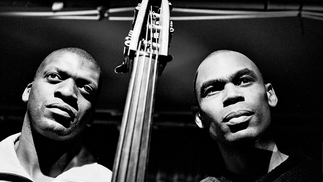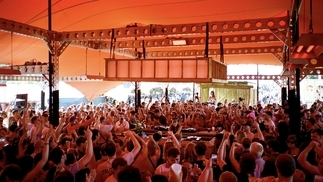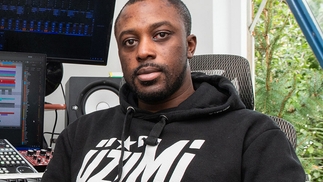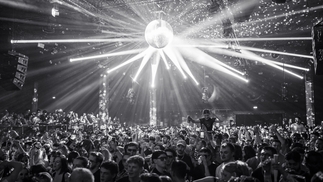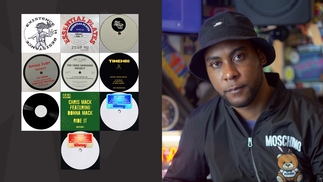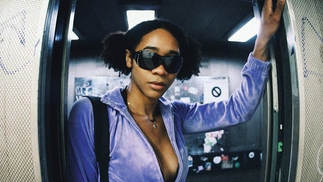DJ EZ: PURE GARAGE VIBES
His undying love for garage kept it alive during leaner times, and as his recent 24-hour set for Cancer Research on Boiler Room showed, his passion, talent and popularity is now greater than ever...
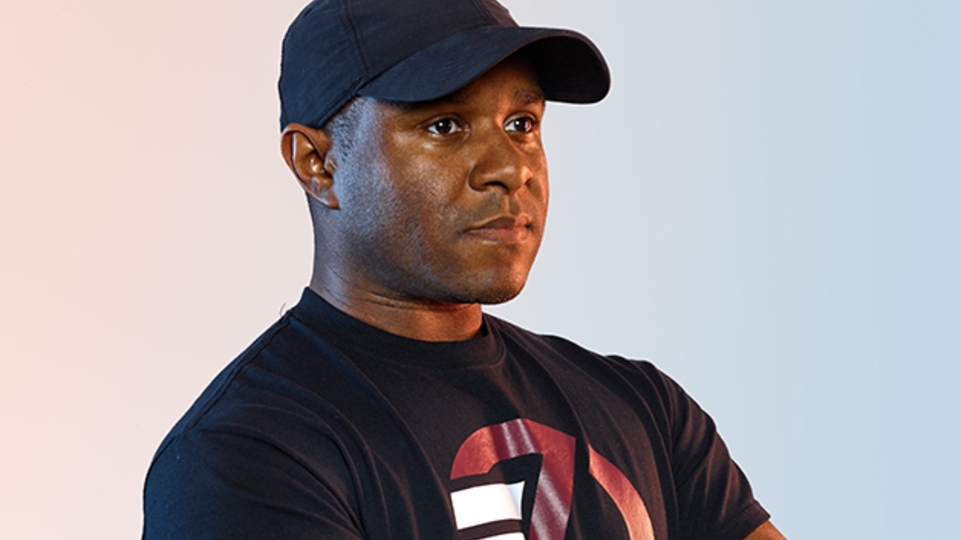
Dressed in black t-shirt and cap, garage don DJ EZ stands in stark contrast to the bright white walls of the south-east London studio that he's in. In front of him on a black draped table are the tools of the trade that he's so precise at operating: a pair of CDJs, and on either side of them a Technics 1210. Inhumanly, he's been mixing, cutting and scratching for the last 24-hours without missing a beat — or seemingly breaking a sweat. Now the sound of MJ Cole's anthemic 'Sincere' — sounding like an ode to EZ's all-consuming passion for garage — is winding down this mammoth session, which he's organised to raise money for Cancer Research and has been broadcast live in its entirety on Boiler Room.
Fading the track out, he thanks the crowd that has gathered unseen off camera in front of him and asks for a minute's cheer to celebrate the £60,000 raised. It takes only a few seconds before the well-wishers are chanting his name instead.
Then the inevitable happens. Someone cheekily requests just one last tune, laughter spreading around the room as various family members are invoked to extend his herculean achievement a few minutes longer. What better way to sign off than with a breakbeat-enhanced version of Bob Marley's 'Three Little Birds', a nod to the musical influence of his mother, its carefree spirit of optimism a reminder that with DJ EZ anything seems possible.
Born in East London, but raised in Tottenham, EZ is the self-confessed nerd whose boyhood interest in computing and electronics might have led to him becoming a computer engineer or programmer. Instead, obsessed by the late '80s sounds of early electronic dance music, he became a DJ, first joining various London pirate radio stations before his standout dexterity on the decks led to a call for him to go legit on Kiss FM.
Championing the emerging sounds of UK garage, this radio show and a series of 'Pure Garage' compilations for Warner Music served as the blueprint for the genre — along the way earning him numerous accolades for Best DJ.
When garage later went through lean times, disappearing underground as new movements like grime, UK funky and dubstep took the limelight, EZ steered the other way, extending his sets to up to ten hours. This singular drive and passion kept the torch burning, rewarding him when its influence exploded again in 2012 with his first Boiler Room appearance and an entry into the cannon of official Fabric mixes. His unrivalled talent finally exposed to the entire world, these days he's as likely to be found in Melbourne or New York as he is London and Ibiza.
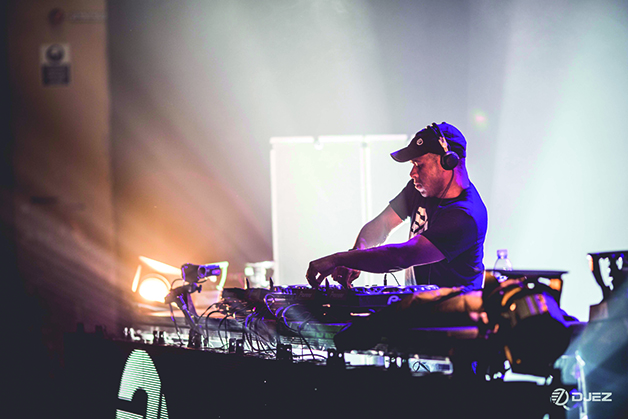
PIRATE STATIONS
EZ's earliest years were already filled with music, thanks to his mum's passion for reggae. But by his early teens he'd begun to develop his own distinct musical identity. Speaking over Skype, he tells us that he was a reclusive kid who preferred to stay home and play on his computer or listen to the radio, rather than mingle with his peers at local community halls. “Then at about 13, I started buying music,” he recalls, his local shop Street Level Records supplying him with the hip-hop, house and electro he was listening to, beginning a collection that now stretches to about 40,000 vinyl in the loft of his house.
Picking up 'House Arrest' by Krush and 'Megablast' by Bomb The Bass as his first purchases, he began to discover seminal artists — Derrick May, Kevin Saunderson, Mantronix, DJ Pierre and Kraftwerk — both through national radio and, increasingly, the influential sound of pirate stations like Centreforce, Horizon, City Radio, Fantasy, Sunrise, Lazer and eventually Dance FM, the Walthamstow station which kicked off his career.
“I was listening to the likes of Tim Westwood, even David Rodigan was around at that time, and I started to record little demo-tapes and send them off to various pirate stations,” he says on his own tentative first steps into DJing, experimenting initially by mixing between two tape-decks, later using the rotary pitch-controlled turntable on his parent's hi-fi system. He began mimicking the patter and shout-outs that he heard on air, recording these through a pair of headphones. As these skills took him out of his bedroom to become the DJ at the school discos and private events he'd previously been missing out on, he set his sights on the next goal — researching pirate stations for a spot on air. “A lot of the tapes I sent off got rejected but there was an opportunity that came up on Dance FM, who were advertising and looking for new talent,” he recalls on what became the first of many major, life-changing breaks. “Surprisingly, I got accepted — and the rest is history.”
The reality at the time sounds slightly more awkward. Just 14 years old, EZ cycled across London to deliver his tape by hand, testament to the dogged dedication, determination and focus which has defined each step up in his career. Today, the tropes of pirate radio are so widely understood that they've evolved into the never meta'd cast of BBC sitcom People Just Do Nothing. As a schoolboy picking up Dance FM's radio waves from another part of the capital though, the reality of the station's bare bones operation came as an eye-opener. “My vision of radio at the time was mainstream radio, proper professional studios, a mixing desk, a professional mic hanging down,” he admits. “When I got sent the address, it didn't sound like an office building.”
Instead, 12 or 13 floors up in a tower block he found a rundown flat with a pair of turntables, a basic mixer and a hand-held microphone. Station managers Reggie Reg and Mike Stone, both in their mid-20s, were understandably dubious about EZ's age but eventually offered him a Sunday morning slot from 8am-12pm. Packing up a bag of his own records, along with some borrowed from his mum and uncle, he arrived at the station only to have them sort through this mixed bag, vetoing some records and lending him others from their own collection to play. But their faith in EZ's enthusiasm lit a spark. “It was a really proud moment,” he says, reliving this first taste. “I got loads of calls. Going back to school Monday morning, I felt like the king of the school, really. There were comments coming from friends, even teachers.”
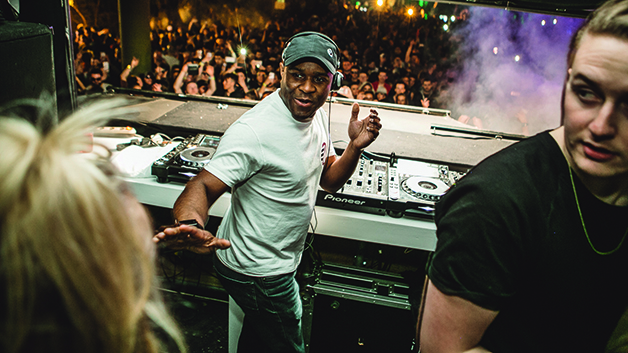
ON AIR
It was school where he'd coined his original DJ name, Easy O, as part of Trickmix — “just me and a few friends into hip-hop, trying to rap, make beats, and wear tracksuits. Round that area it was trainers with thick laces. I used to breakdance too.”
Though the group split, these musical ambitions always remained. Unfortunately for his education, as his reputation spread at Dance FM — his tender years and prodigious talent earning him the nickname ‘The Bad Young Brother’ — he began spending more and more time at the station, whose roster also included a pre-Shamen Mr C and jungle pioneer Kenny Ken. Eventually he moved into the flat it broadcast from, learning its inner workings and spending more and more time on air, covering shows and getting promoted to a Saturday morning set. One Christmas Day, when the station's other DJs preferred to stay home with their families, he single-handedly manned the fort with a 13- or 14-hour session, a precursor to his taste for sweeping marathon sets.
Dance FM was closed by the DTI/Radio Authority in 1993, but by this point Easy O was already a fixture on the East London club circuit, playing at under 18 and Dance FM events. His style was also gravitating from acid, house and techno to the emerging sound of hardcore, so he decided his name should evolve too, morphing into EZO. “I loved hardcore, its energy, its fast pace, so I just switched up for a bit,” he says.
Such was his desire to get back on air, he found a way to convert a spy pen into a radio transmitter, launching his own station, Dimension FM. First just broadcasting to friends and family in the streets local to his house, he was later able to extend it to around a five miles radius, again building a following.
“I then came across the sound of garage on Freek FM, and other stations like London Underground,” he says on the final sonic and name transition from which EZ, as he's known and loved today, emerged. “I came across a DJ playing Todd Edwards and when I heard that, that was it for me, I just wanted to get into it.”
Joining the station for four years, he continued to build his professionalism, presenting a four-hour breakfast show as well as a Sunday afternoon Weekend Wind-Down.
The term garage, as pointed out by Bill Brewster, has been a nebulous entity over the years, so what's EZ's understanding of it? “That's a reason I didn't say I discovered UK garage listening to Freek, because at the time it was garage,” he says on the term's first evolution from its roots as the sound of the Paradise Garage, where Larry Levan span everything from dub and soul to disco and early house, to a more specific, swung house sound. “It was US garage, MK stuff played a bit faster, US house sped up. Then you had the move over to the bassier sound created by UK producers, the likes of 'RIP Groove' etc, that got the speed garage term. Then you had two-step that came in. Then the UK garage genre was formed.” The turning point to this most well-understood incarnation, he reckons, began with the release of the remixes of Tina Moore's 'Never Let You Go' in 1997.
Part of the management at Freek, he dealt with the realities of running a pirate even as his own reputation was sky-rocketing, Kiss FM asking him to cover for the likes of Steve Jackson and Bobby & Steve before he filled in a full two-hour show for an absent Tuff Jam. “As garage exploded, loads of other stations popped up. Freek FM was the main station, so there was jealousy. Other stations would come and take down the rig, or go up on the tower blocks and remove your ariel, smash up your transmitter — that kind of thing. You had to find new sites alongside the hassle of the radio fraud team. Fortunately, I never got caught.”
At the same time he was playing extended four-hour sets for Club Z, a party he ran at Gass Club off Leicester Square in London, where he'd spin the likes of Steve Gurley and TJ Cases to dedicated garage heads, old ravers, curious junglists and new converts. “Doing longer sets was amazing. You could take them on a vocal journey to start off with, then get harder throughout the night, then end off with classics. It was a real turning point for me.”
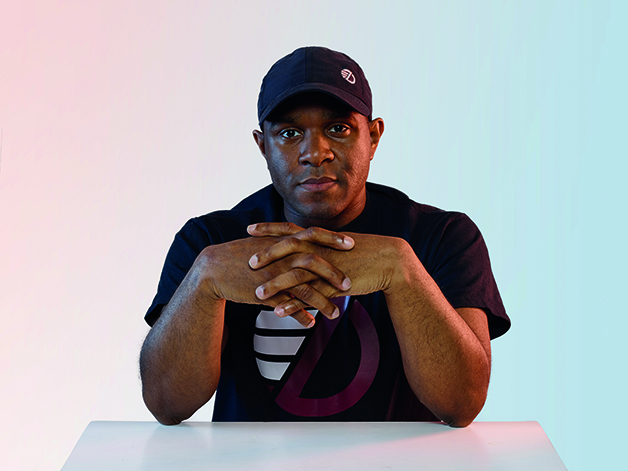
KISS
At the end of 1999, Kiss FM made the call that was to expose EZ's standout talent to the whole of London, and also realise his teenage ambition. “I started listening to radio at 13 years old and always wanted to be on a station. After getting onto Dance FM, then onto Freek, obviously my ambition was to get onto legal radio. When I got the call it was, 'Oh my God, I've done it.'”
Though he started off on a graveyard Tuesday morning 2-4am shift, he was soon promoted to a primetime Saturday night slot, then started doing Fridays too. Pulling in six-figure listeners week after week, he remained a mainstay of the station till 2014, throwing his support behind everything from two-step to bassline.
This eclecticism — as willing to play cut-up R&B vocal tracks for the ladies to exploring the hardcore echoing sound of breakbeat garage, and his ability to seamlessly weave it all together — was probably why Warner chose him from its original shortlist to mix the first 'Pure Garage' compilation at the turn of the new millennium. Selling over 250,000 copies, it furnished his mantlepiece with his first plaque for music sales and went onto spawn four more chapters, as well as numerous spin-offs such as 2003's 'Four To The Four' compilation. In true EZ style, once the tracks were cleared, each mix was done live and off the cuff. “I was known for breaking a lot of new material, so I got a lot of promos first and lots of exclusives,” he recalls of how it enhanced his DJ credentials. “It was a good time.”
With all this exposure and a record bag full of the hottest tracks, EZ was at the centre of a huge demand that has never let up. “On New Year's Eve I could do four or five gigs in one night, racing from one part of London to another. It was mainly London shows that I did back then, a few up North. It was crazy times.”
Z Uncut, which started off in the garage haven of Ayia Napa in 2002, focused the attention again on his passion for long sets, its UK excursions subsequently stretching to eight-hour-plus performances at giant venues such as London's O2. The following year he also launched 4by4 on January 1st, featuring four DJs playing four to the floor, finally meeting Todd Edwards when he invited him to play the debut party at Time and Envy in Romford. “To me he's a hero, so I was like a star-struck kid, but we turned out to be good friends,” EZ says. The party ran for a further three years, MJ Cole, Wideboys, Grant Nelson and Booker T amongst those who joined EZ on the first day of each New Year.
As garage's popularity waned, disappearing from the charts, EZ began to incorporate the sounds of dubstep and funky house into his sets but his elemental enthusiasm almost single-handedly kept the flag flying. “I had such a passion for it, I didn't really ever see it or believe it,” he says of this period at the end of the noughties. “I thought there was always a need, and there were always clubs that wanted to hear garage music. My bookings remained healthy. I also still had the radio show, and the radio show figures weren't declining, they were actually on the rise.”
GARAGE RENAISSANCE
The release of his ‘FabricLive 71’ mix in 2013 — after the club had witnessed the EZ phenomenon the previous year, when he played a ten-hour Z Uncut set there — was an official stamp on the garage renaissance from a club that had done more than most to incubate London's contemporaneous and subsequent bass offshoots. It was also a snapshot of EZ's sound, classics like Wookie's remix of Sia's 'Little Man' and Dem 2's 'Destiny' siting alongside their modern-day ilk, tracks such as Royal T's 'I Know You Want Me' and DJ Q's 'Classified Bass'. This, combined with a joint Red Bull and Boiler Room broadcast celebrating London's dance culture, opened the door to new horizons, first at a string of UK and international festivals, then at club shows across the Atlantic.
“It was quite nervy, because I didn't know if anybody would even have heard of me out there,” he says on his first American appearance for AC Slater and the Night Bass crew at Sound in LA. But thanks to the influence of the internet, alongside a loyal ex-pat following, he was soon playing in cities such as New York and Detroit too, a new US agent ensuring that his popularity is now “building day by day”.
His 24-hour charity set was thought up with his management team as a way of stepping out of his comfort zone again and doing something different. Cancer Research entered the picture because they “solely rely on donations from the public, they don't receive any government funding, so every penny we raised would help saving lives”.
EZ made it look easy, but even he had doubts the night before, only able to sleep for three or four hours as the enormity of his undertaking loomed into view. Alongside his natural energy, it was the support of family members and fans, both those invited into the studio and those following on social media, that saw him through the rare weary moments. “Watching the total figure raised was motivation in itself,” he adds on the unprecedented amount that was raised. “Wow, let's do this."
Carrying on doing 'this', constantly bigger and better, is just EZ's nature, every new challenge stoking the fire in his belly. “I'm really excited about the music right now, there are so many styles,” he enthuses. “The only thing that bothers me is that there are so many tracks that are garage, but are given another term. They're blatantly garage! Like a lot of the jackin' house stuff.”
It's perhaps this that's driving his desire to start playing records again, while also saying he'll get his nephew to sort out his doubles and triples to sell on. “There are tracks that are made now that sound quite similar to tracks I was playing early in my DJ career. That's why I want to get digging. I also want to show people my roots and where I come from. I guess the kids see me in one light at the moment, going to a club or festival and hearing certain tracks. They don't really take time to go onto my website and read my biography at DJEZ.com,” he says, laughing at the automatic reflex of his well-honed promotional skills after years on the radio.
For now, though, it's another packed summer, taking in Reading & Leeds, V Festival, SW4 and Creamfields in the UK, and Amnesia, Ushuaia, Sankeys, Ibiza Rocks and Space in Ibiza, an island he's been playing since the late '90s.
“For me, UK garage, I just love it, because it's got so many sides,” he says on the sound that not only defined DJ EZ, but which he in turn championed in all its wide-reaching and multi-faceted glory. “It's got the soulful side, it's got the harder side, obviously it's got the girly side. It's got so many elements to it.”
Nobody, though, can take a crowd through them all as expertly, or for as long, as DJ EZ.
FIVE LITTLE-KNOWN EZ FACTS
* When still a teenager DJing under the name Easy O, EZ was asked to provide vocals for the track 'Cure For Sanity' by Midlands grebo band Pop Will Eat Itself. This was his first time in a recording studio.
* He was able to build the transmitter for his own pirate radio station, Dimension FM, thanks to the circuity skills he'd learnt as a kid from a home electronics kit called Science Fair.
* His first forays into productions were actually in the hardcore era, putting out the uncredited tracks 'My Vision Is Clear' and 'Eclipse' in 1993 on 'The Transitional Rhythms' EP released by Chris Energy's HNR Records.
* All the intros at the start of his 'Pure Garage' compilations were produced by EZ and in 2000 he set up his own label, Z Recordings (later changed to One Recordings), putting out a number of EPs such as 2000's 'The Next Chapter'. Only lack of time — due to his unbroken DJ schedule — has stopped him from putting out more original productions so far.
* The teetotal EZ normally plays his eight-hour-plus Z Uncut set without a single toilet break. However, preparations for his 24-hour charity wisely involved timing exactly how long it would take for him to get to the studio toilet and back.
